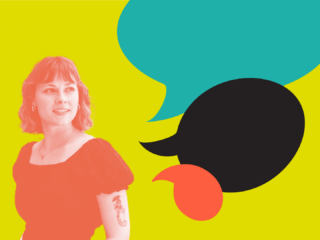I’m up late wrangling a beast of an editing job. The deadline is tomorrow, and I’ll be damned if this is waiting for me in the morning. I buckle down and make myself organize, think, and generate words at top speed. I feel like I’m driving my brain against the front of my skull. It’s frustrating work—especially at 11pm—but I refuse to stop. Even in the frustration, I’m in a flow—that runner’s high for writers where time evaporates and the world around you disappears, leaving only you and your work. At midnight, I wrap up after four hours and go to bed exhausted but victorious.
This is not an example of my normal workday (fortunately) but rather the intensity with which I work as a full-time editor of thought leadership at LEFF. I spend 70 to 80 percent of my time researching, outlining, drafting (my most dreadful task), and editing for clients with complicated, highly technical projects. Whether it’s 11 a.m. or 11 p.m., I’m trying to make sense of complicated charts and how they support a narrative; translate opaque language into clear, digestible information for readers; or strategize about the strongest structure for the material we were given.
This intensity is new for me. Before joining LEFF in September of 2022, I was a freelance editor and content writer for several years, as well as a creative nonfiction writer. While I did immersive work both professionally and artistically, I didn’t do it at a super high frequency. If you’ve ever been a freelancer, you know that you spend as much time—or more—running your business as you do working for clients.
As far as my creative writing practice went, I didn’t have any excuses. I just didn’t push myself to develop an everyday practice. “You gotta put your butt in the seat,” a writer friend once told me. I had trouble doing that. (Even while writing this blog, I’ve gotten up at least 10 times to make soup.) I wrote often, but I struggled to complete new work unless I had a deadline. Worse than that, I felt guilt and shame for not writing “enough” or living up to the writing habits of those around me.
Then, in 2020, I called it quits with writing. I had a one-year-old, little to no time to myself, and more responsibilities on my plate than I’d ever had in my life. I didn’t have the bandwidth to guilt or shame myself for not writing. So I decided that I wouldn’t write unless I wanted to. Slowly, I started letting go of my self-imposed expectations of who I had to be as a writer. The nagging voice in my head berating me for not writing every day grew quieter and then mostly disappeared. And over the next two years, sans any kind of pressure, I took some writing classes and published two pieces I generated from them—and that was OK. Not trying to create or maintain a strict writing practice also gave me more headspace to run a business, which eventually put me in a stronger position to join the LEFF team.
And then another surprising thing happened. Becoming a full-time editor at LEFF actually made me a better writer overall—including in my creative work. Here, I have to write or edit every day—otherwise, my clients will be pissed and I won’t get paid. More importantly, I want to get better at my job. And I know I have because of how much easier it’s become to work on personal projects. Working with words and ideas that are just mine? Sounds like floating on a cloud with an Aperol spritz in hand. I can now more easily spot and solve structural issues with my work; I can get to what I really want to say more quickly; and, maybe most significantly, I can push through any reservations or urge to procrastinate (most of the time) and just do the work. I’m not as afraid of failing or writing a bad sentence. I’m more confident that I can at least get something on the page that I could come back to later.
Don’t get me wrong—I still don’t have a consistent creative writing practice. My one-year-old is now a four-year-old, and having a full-time job on top of being a parent makes it almost impossible to choose writing over a much-needed nap or zoning out to an episode of The L Word: Generation Q. What I do have is a writing practice at work. My job has unexpectedly provided me with the intensity and consistency I needed to grow as a creative writer. It’s true that I had to put my butt in the seat to be a better writer; I just had to find which seat worked best for me.




Leave a Reply
You must be logged in to post a comment.